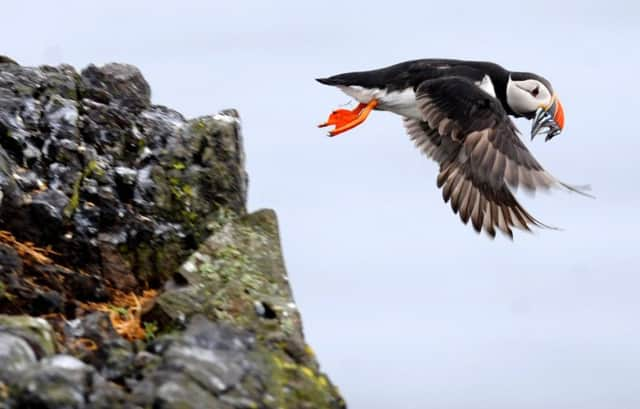‘Protect Scottish seabirds from deadly wind farms’


Scotland is home to 24 internationally important seabird species. But the latest official figures show at least nine have been in steep decline for the past 18 years.
Now a new report from RSPB Scotland is calling for the Scottish Government to set out seven new Special Protection Areas (SPAs) to safeguard food supplies for threatened birds and reduce the impacts of offshore wind farms.
Advertisement
Hide AdAdvertisement
Hide AdAs the seas are increasingly being utilised for renewable energy developments, conservationists say guidance on sensitive areas is urgently needed to address a “fundamental lack of protection” for species such as the puffin and great skua.
The RSPB is also warning that the Scottish and UK governments risk failing to meet obligations under Scottish and European laws if “urgent action” is not taken to encourage their survival.
Stuart Housden, director of RSPB Scotland, said: “Scotland has a fantastic opportunity to show the world that we value our wildlife and natural environment.
“Unfortunately, this is not the case when it comes to our iconic seabirds, species for which Scotland in particular has a special responsibility to protect.”
He said the seven areas are just “a first step” in creating a full network needed to satisfy the requirements of EU and Scottish legislation.
“With numerous proposed wind farm developments ‘queuing up’ in the areas that overlap key feeding sites for birds, we cannot wait any longer,” he added.
The most dramatic declines have hit the arctic skua, arctic tern and black-legged kittiwake, which have seen numbers plummet by as much as 80 per cent in recent years. Experts fear the arctic skua may disappear from the UK within a decade.
Other species of concern include the northern gannet, European shag, common guillemot and European storm petrel.
Advertisement
Hide AdAdvertisement
Hide AdEvidence shows changes in oceanography are affecting the food “web”, causing a scarcity of prey that impacts on breeding success.
But the survival of vulnerable populations can also be threatened by badly sited marine renewable schemes and invasive alien species, according to the report.
It suggests setting out protected areas at sea can boost their chances of survival.
The recommended areas were first identified in 2012 by the government’s statutory advisors, the Joint Nature Conservation Committee, and are considered vital feeding areas used by many tens of thousands of Scotland’s four million seabirds.
The government has already laid down 33 SPA colony extension sites, but experts say most of the critical areas where breeding species feed at sea remain unprotected.
The report recommends the SPAs should include colony extensions and offshore feeding areas, as both are essential for the birds to thrive.
“Without protection of these areas, breeding colonies designated as terrestrial SPAs and Sites for Special Scientific Interest risk being little more than safe places to starve, and leave seabirds unprotected through the majority of their lifecycle,” the report states.
But a spokesman insisted the Scottish Government is committed to safeguarding the nation’s seabirds.
Advertisement
Hide AdAdvertisement
Hide AdHe said: “We are confident that completion of marine SPA designations will deliver adequate site protection for seabirds.
“We recently consulted on 33 Nature Conservation Marine Protected Areas (MPA) proposals, which will provide valuable protection for our marine environment, including seabirds, in 2013.
“Six of these would include national protection for black guillemot in the marine environment, while several of the other MPA proposals include protection for habitats or species such as sand eels that support seabirds.”
The initial SPAs include sandbanks off the Firth of Forth, an area of the Pentland Firth and the sea north of St Kilda, but RSPB Scotland is set to propose further sites in coming months.
Final decisions on the MPA proposals are expected later this year.